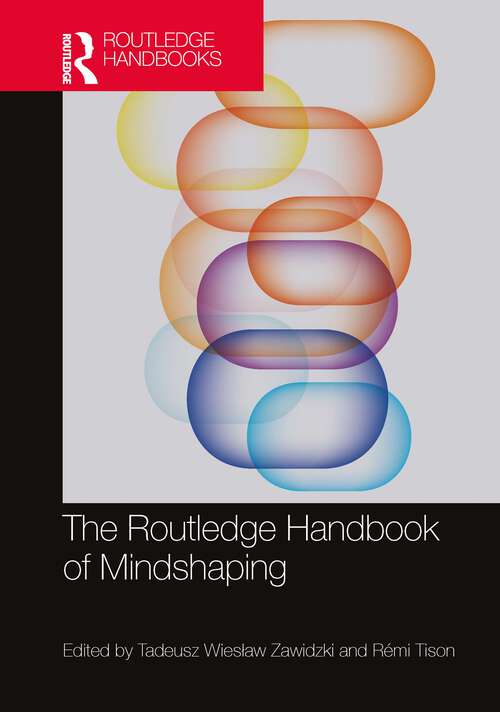The Routledge Handbook of Mindshaping (1) (Routledge Handbooks in Philosophy)
By: and and and and and and and and and and and and and and and and and and and and and and and and and and and and and and and and and and and and and and and and and and and and and and and
Sign Up Now!
Already a Member? Log In
You must be logged into Bookshare to access this title.
Learn about membership options,
or view our freely available titles.
- Synopsis
- Of all species, human beings are uniquely capable of coordinating on long-term, large-scale cooperative projects with unfamiliar and genetically unrelated others. According to the mindshaping hypothesis, this relies on mechanisms and practices like imitation, pedagogy, normative cognition, and narrative self-constitution, which shape us into expert coordinators, without requiring time consuming and epistemically fraught attempts to read each other’s minds. Mindshaping has been applied to many areas of inquiry, including game theory, shared agency, communication, the ontogeny of human cognition, the dissemination of scientific knowledge in popular media, mental illness, and the influence of social media technologies.The Routledge Handbook of Mindshaping is the first volume of its kind. Comprising 37 chapters by an international team of leading scholars, this Handbook is organised into seven sections: Mindshaping and coordination Mindshaping and cognitive psychology Mindshaping and normativity Mindshaping and epistemology Social and political dimensions of mindshaping Nonhuman mindshaping Mindshaping applied Within these sections, key topics are addressed, including game theory, social signalling and shared agency, folk psychology, the emotions, language acquisition and memory, stereotyping and consciousness-raising, moral agency, self-knowledge, rationality, epistemic norms, primate sociality, human-elephant relations, artificial intelligence, mental illness and neurodiversity, aesthetic expression, and politics.An outstanding survey of a vibrant and emerging field, The Routledge Handbook of Mindshaping will be of great interest to those studying and researching philosophy of psychology, philosophy of cognitive science, philosophy of mind, and applied epistemology. It will also be of interest to those in related disciplines such as cognitive psychology, sociology, and anthropology.
- Copyright:
- 2025
Book Details
- Book Quality:
- Publisher Quality
- Book Size:
- 528 Pages
- ISBN-13:
- 9781040355084
- Related ISBNs:
- 9781032639192, 9781032639239, 9781040355060
- Publisher:
- Taylor & Francis
- Date of Addition:
- 05/29/25
- Copyrighted By:
- selection and editorial matter Tadeusz Wiesław Zawidzki and Rémi Tison
- Adult content:
- No
- Language:
- English
- Has Image Descriptions:
- No
- Categories:
- Nonfiction, Philosophy
- Submitted By:
- Bookshare Staff
- Usage Restrictions:
- This is a copyrighted book.
- Edited by:
- Tadeusz Wiesław Zawidzki
- Edited by:
- Rémi Tison
Reviews
Other Books
- by Daniel Kelly
- by Wynn C. Stirling
- by Michelle Maiese
- by Jaroslav Peregrin
- by Don Ross
- by Sam Wilkinson
- by Fredrik Stjernberg
- by Shannon Spaulding
- by Julian Kiverstein
- by Ladislav Koreň
- by Eric Funkhouser
- by Ian Apperly
- by Marc Slors
- by Kristina Musholt
- by Alessandra Tanesini
- by Christopher Jude McCarroll
- by Julia Wolf
- by Fernando Martínez-Manrique
- by Tadeusz Wiesław Zawidzki
- by Rémi Tison
- by Nikola Andonovski
- by Virginia Ballesteros
- by Leda Berio
- by Devin Sanchez Curry
- by Laura Danón
- by Léon De Bruin
- by John Dorsch
- by Matej Drobňák
- by Víctor Fernández-Castro
- by Colum Finnegan
- by Simon Fitzpatrick
- by Marianna B. Ganapini
- by Adam Gies
- by Trip Glazer
- by James Grayot
- by J. P. Grodniewicz
- by Núñez de Prado-Gordillo, Miguel
- by Lucy Osler
- by Dennis Papadopoulos
- by Daniel Pérez-Zapata
- by Uwe Peters
- by Enrico Petracca
- by Zuzanna Rucińska
- by Ayana Samuel
- by Derek Strijbos
- by Brandon Tinklenberg
- by Mason Westfall
- by Evan Westra
- in Nonfiction
- in Philosophy
